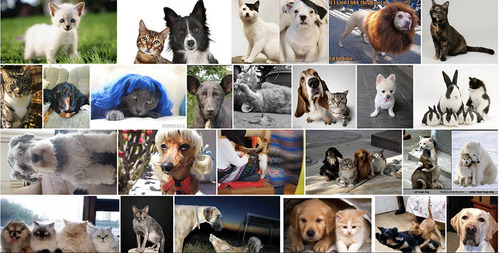By Aryeh Kontorovich
So how do you tell a cat from a dog? It's something a three-year-old does with near-perfect accuracy, but not something we can formalize in simple rules or easily write code for.
When searching for “cats that look like dogs,” here’s what comes up:
 Traditional Artificial Intelligence (AI) attempts to produce clean, interpretable decision rules. Modern machine learning takes this a step further: Rather than trying to feed computers man-made rules, we hope computers will discover their own rules based on examples so that many tasks requiring human input will become fully automated. In other words, we need machines to learn.
Yahoo scientists and engineers are faced with solving numerous learning-related problems. As a visiting scientist from Ben Gurion University who has, by now, spent some time working alongside Yahoos, I have come to respect the amount of hands-on experience my colleagues have with standard machine learning algorithms: SVM, boosting, nearest neighbors, decision trees.... Of course, many of these algorithms are simple and intuitive (such as, "Given a test point, predict the label of the closest training point"). But, their mathematical underpinning is not always well understood.
Using my background in theoretical machine learning research, I instructed a recent seven-week course at Yahoo with the aim of providing a theoretical foundation on which the aforementioned algorithms are based. Why does a large margin guarantee good generalization? How does one avoid overfitting? What are the "no free lunch" results in learning? What is the best learning rate one could hope for? Using rigorous mathematical tools, the course provides answers to these questions.
I am firmly of the conviction that “there is nothing so practical as a good theory.” My hope is that deep insight into common learning algorithms will give practitioners a better sense of which ones are more applicable in any given situation, and perhaps even guide other scientists, engineers, etc. in designing novel approaches.
One of the benefits of the open academic collaborations that Yahoo Labs encourages, including mine, is the knowledge transfer each party brings to the table. It is in the same spirit of collaboration and open discourse that we are offering all of the seven classes below for your professional and/or personal enrichment. I hope you find them useful.
Week 1:
Week 2:
Week 3:
Week 4:
Week 5:
Week 6:
Week 7:
Traditional Artificial Intelligence (AI) attempts to produce clean, interpretable decision rules. Modern machine learning takes this a step further: Rather than trying to feed computers man-made rules, we hope computers will discover their own rules based on examples so that many tasks requiring human input will become fully automated. In other words, we need machines to learn.
Yahoo scientists and engineers are faced with solving numerous learning-related problems. As a visiting scientist from Ben Gurion University who has, by now, spent some time working alongside Yahoos, I have come to respect the amount of hands-on experience my colleagues have with standard machine learning algorithms: SVM, boosting, nearest neighbors, decision trees.... Of course, many of these algorithms are simple and intuitive (such as, "Given a test point, predict the label of the closest training point"). But, their mathematical underpinning is not always well understood.
Using my background in theoretical machine learning research, I instructed a recent seven-week course at Yahoo with the aim of providing a theoretical foundation on which the aforementioned algorithms are based. Why does a large margin guarantee good generalization? How does one avoid overfitting? What are the "no free lunch" results in learning? What is the best learning rate one could hope for? Using rigorous mathematical tools, the course provides answers to these questions.
I am firmly of the conviction that “there is nothing so practical as a good theory.” My hope is that deep insight into common learning algorithms will give practitioners a better sense of which ones are more applicable in any given situation, and perhaps even guide other scientists, engineers, etc. in designing novel approaches.
One of the benefits of the open academic collaborations that Yahoo Labs encourages, including mine, is the knowledge transfer each party brings to the table. It is in the same spirit of collaboration and open discourse that we are offering all of the seven classes below for your professional and/or personal enrichment. I hope you find them useful.
Week 1:
Week 2:
Week 3:
Week 4:
Week 5:
Week 6:
Week 7: